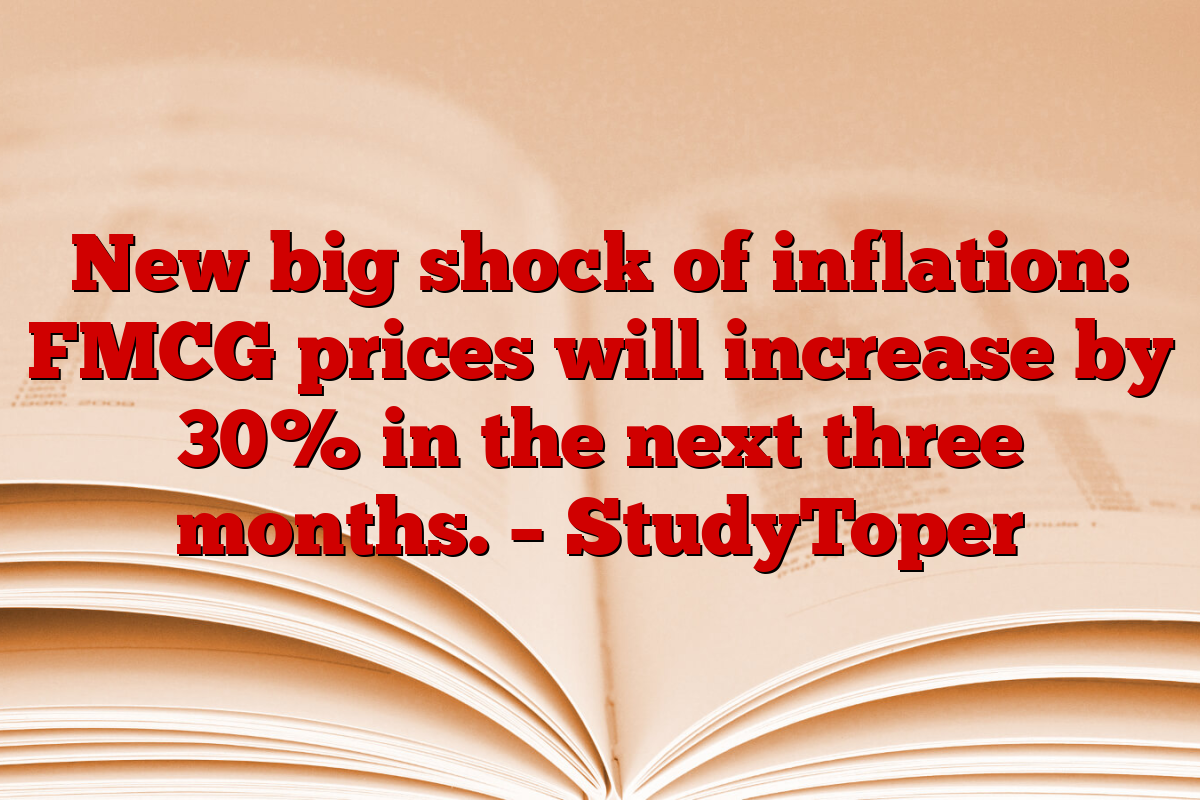Inflation remains a big problem in India. There is already huge pressure on people’s pockets and now a new shock is about to come. There is a possibility of an increase of up to 30% in the prices of FMCG (Fast-Moving Consumer Goods) i.e. items of daily use in the next three months. This news is a matter of concern for the common man.
In this article we will discuss in detail the reasons, effects and measures to deal with this huge price increase in the FMCG sector. We will also know how this inflation can be avoided and what steps the government is taking to deal with this problem.
Overview of price rise in FMCG sector
| Description | Information |
| price rise forecast | up to 30 |
| time period | next 3 months |
| affected area | FMCG Sector |
| main reason | Increase in raw material prices |
| Affected Products | Foods, Personal Care, Household Items |
| impact on consumer | Increase in inflation, change in purchasing pattern |
| impact on companies | Increase in costs, pressure on profits |
| government action | Price control, increase in subsidies |
What is FMCG sector and its importance
FMCG or Fast-Moving Consumer Goods sector deals with the products that we use daily. This includes food items, personal care and household items like soap-shampoo, toothpaste, detergent. This sector is an important part of the Indian economy.
Features of FMCG Sector:
- low price products
- mass production
- regular shopping
- Low margins, but large volume sales
The increase in prices in this sector has a direct impact on the pockets of common people. Therefore, price increase of up to 30% is a matter of serious concern.
Main reasons for price increase
There are many reasons behind such a huge increase in the prices of FMCG products:
- Increase in prices of raw materials: Due to increase in prices of raw materials like oil, wheat, sugar, production costs have increased.
- Increase in prices of packaging material: Packaging materials like plastic, cardboard have become expensive.
- Increase in Transportation Cost: Due to increase in the prices of petrol and diesel, transportation of goods has become expensive.
- Increase in electricity and labor costs: The cost of production in factories has increased.
- Changes in GST rates: Prices have been affected by the increase in GST on some products.
- Disruption in global supply chains: Supplies have been affected due to the COVID-19 pandemic and the Russia-Ukraine war.
Major FMCG products to be affected
The price increase will affect almost all FMCG products, but some products will be more affected:
- Food ingredient:
- flour, pulses, rice
- edible oil
- Milk and Dairy Products
- Biscuits and Snacks
- Personal Care Products:
- soap and shampoo
- toothpaste
- Creams and Lotions
- Household Goods:
- detergent
- kitchen cleaner
- air freshener
- beverage:
- tea and coffee
- cold drinks
- fruit juice
Effect of price increase on consumers
The increase in prices of FMCG products by up to 30% will have a deep impact on common consumers:
- Change in purchasing patterns: People will shift from expensive brands to cheaper brands.
- Changes in Budget: The share of FMCG expenditure in the domestic budget will increase.
- Change in lifestyle: Some people will reduce the purchase of luxury items.
- Impact on savings: Due to increase in inflation, people’s savings will reduce.
- Health effects: Some people may cut down on nutritious food.
Impact on FMCG companies
Price increase will also impact FMCG companies:
- Increase in costs: Companies’ expenses will increase due to increase in raw material and production costs.
- Pressure on profits: Increasing prices may affect sales, which will impact profits.
- Change in marketing strategy: Companies can focus on smaller packs and lower priced products.
- Delay in new product launch: Companies will be cautious in launching new products.
- Supply chain improvements: Companies will make supply chains more efficient to reduce costs.
Steps being taken by the government
The government is taking several steps to control inflation:
- Price Control: Price control can be imposed on some essential commodities.
- Increase in subsidy: Subsidy can be increased to provide relief to poor families.
- Revision in GST rates: GST rates on some FMCG products may be reduced.
- Reduction in import duty: Import duty on raw materials can be reduced.
- Stock Limit: Stock limit can be imposed to prevent hoarding.
Tips for Consumers
Consumers can take some measures to avoid inflation:
- Make a budget: Make a proper budget of monthly expenses and stick to it.
- Bulk Buying: Buy in large quantities by taking advantage of discounts and offers.
- Brand Switching: Shift from an expensive brand to a cheaper but good quality brand.
- Local Products: Prefer local products which are often cheaper.
- Reduce wastage: Reduce wastage of food items.
- Adopt DIY: Make some products like face packs, hair masks at home.
Future of FMCG sector
After this period of inflation, some changes may be seen in the FMCG sector:
- Digital Marketing: Companies will pay more attention to online sales.
- Development of cheap products: Focus on low cost products will increase.
- Change in packaging: The trend of low-cost and environment-friendly packaging will increase.
- Local Sourcing: Companies will focus on purchasing raw materials locally.
- AI and Automation: Use of technology will increase to reduce costs.
Disclaimer:
This article is for informational purposes only. The information contained herein has been collected from various sources and may change over time. The actual increase in prices of FMCG products may vary for different companies, products and locations. Please consult official sources for more information before making any important decisions. The author or publisher is not responsible for any damages or consequences caused by the use of this information.
